
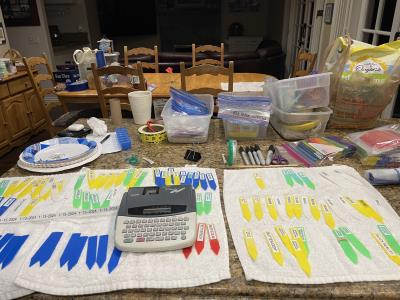

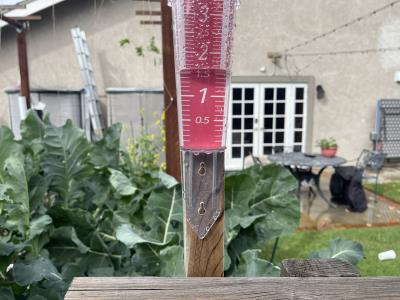

Blog Overview
I started blogging again in July 2023 after some shifting of my job responsibilities, and my children growing up which gave me a lot more discretionary time. I do this for me, but I hope some others find my posts interesting or useful in some way.Entrepreneaur Pieter Levels - His Interview Was Very Eye Opening For Me
10/19/2024 by Alan

I was listening to the Lex Fridman Podcast - episode #440, and he interviewed this random guy. I learned so much and he answered some questions that I didn't even know how to ask for website and programming challenges I have had my whole career. I am so thankful I heard this.....
Post Content, Images & Videos
I was listening to the Lex Fridman Podcast - episode #440, and he interviewed this random guy. I learned so much and he answered some questions that I didn't even know how to ask for website and programming challenges I have had my whole career. I am so thankful I heard this. Since I listened to this over a month ago, I have relistened to parts a few times once again, and now I am listening to the entire 3.5 hour podcast to capture all the gold nuggets it contains.
Some of the topics were:
- Simple Programming using 'vanilla' HTML, JavaScript, JQuery, PHP, and SQLite
- Stripe Payment System
- doing proof of concepts quickly
- Image Models: Stable Diffusion
- Hosting: Replicate.com
- Photo's: photoai.com
- Image Detection: Google Vision
Some of the topics were:
- Simple Programming using 'vanilla' HTML, JavaScript, JQuery, PHP, and SQLite
- Stripe Payment System
- doing proof of concepts quickly
- Image Models: Stable Diffusion
- Hosting: Replicate.com
- Photo's: photoai.com
- Image Detection: Google Vision
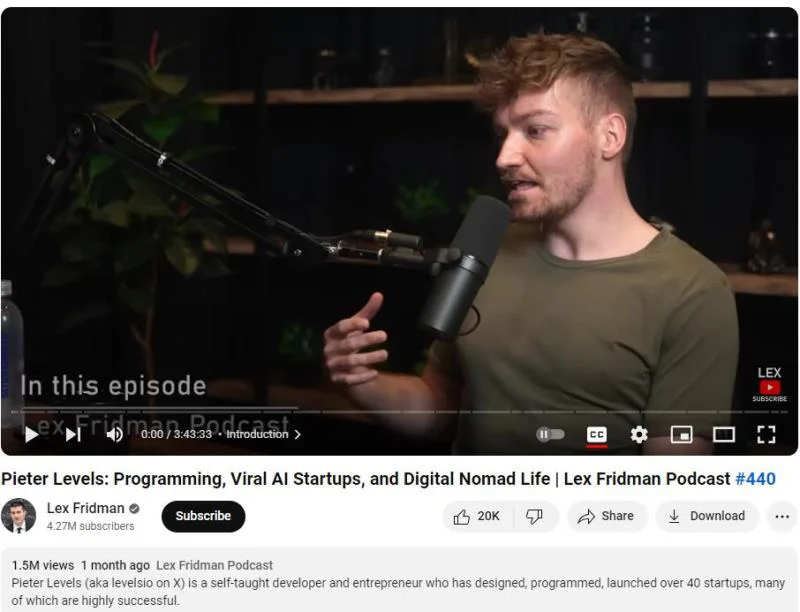
Simple Programming with PHP, JavaScript, JQuery, and SQLite
This might be the biggest game changer of my programming life!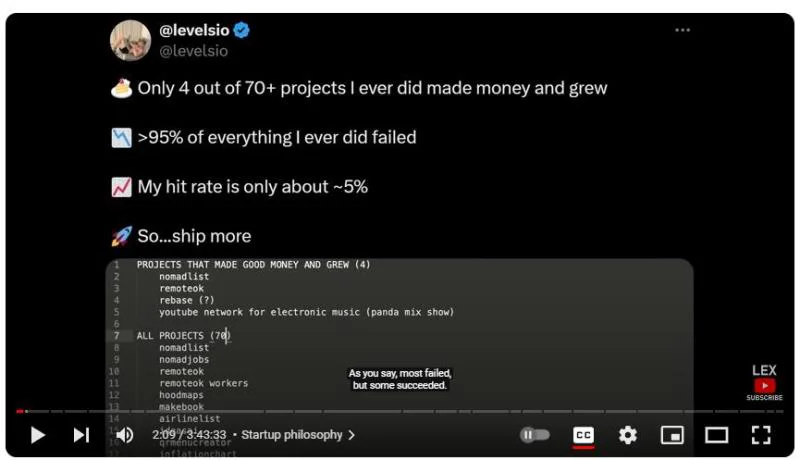
Payment System Stripe
I have not investigated this as of 10/18/2024, but I will soon!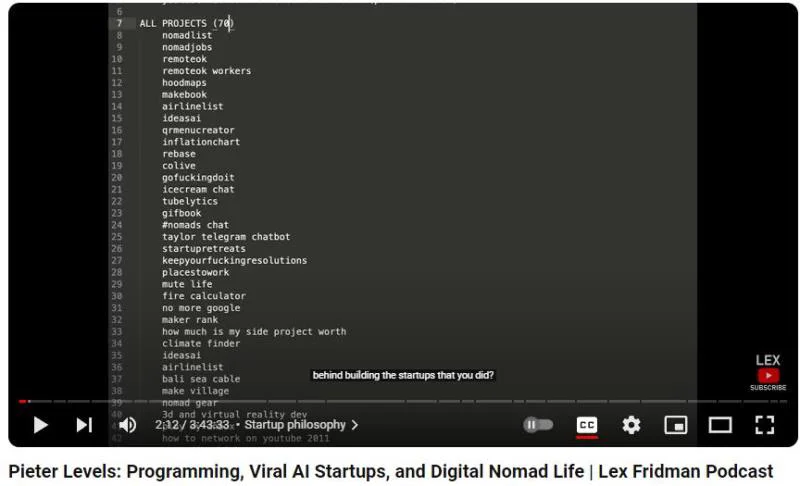
His Project (Businesses)
2:12 at the video lists them all
Transcript
Lex, my apologies if you don't want this out here, let me know in the homepage comments if you want me to remove it.0:00 - So I was trying to figure out how to do photorealistic AI photos and it was... Stable Diffusion by itself is not doing that well. 0:05 The faces look all mangled- - Yeah. - And it doesn't have enough resolution or something to do that well. 0:11 But I started seeing these base models, these fine tune models, and people would train them on porn, and I would try them, 0:17 and they would be very photorealistic. They would have bodies that actually made sense, like body anatomy. 0:25 But if you look at the photo realistic models that people use now, still, there's still core of porn there, 0:30 of naked people- - Yeah. - So I need to prompt out the naked, and everyone needs to do this with AI startups with imaging. You need to prompt out the naked stuff. 0:36 - You have to keep reminding the model you need to put clothes on the thing. - Yeah, don't put naked 'cause it's very risky. I have Google Vision- - Yeah. 0:42 - That checks every photo before it's shown to the user to like check for NSWF. - Like nipples detector? Oh, NSFW detector. (chuckles) 0:48 - Because the journalist gets very angry. - The following is a conversation 0:53 with Pieter Levels, also known on X as levelsio. 0:59 He is a self-taught developer and entrepreneur who designed programs shipped and ran over 40 startups, 1:06 many of which are hugely successful. In most cases, he did it all by himself 1:12 while living the digital nomad life in over 40 countries, in over 150 cities, 1:19 Programming on a laptop while chilling on a couch, using Vanilla HTML, jQuery, PHP, and SQLite 1:28 He builds and ships quickly and improves on the fly, all in the open, documenting his work, 1:35 both his successes and failures with a raw honesty of a true indie hacker. 1:40 Pieter is an inspiration to a huge number of developers and entrepreneurs who love creating cool things in the world 1:47 that are hopefully useful for people. This was an honor and a pleasure for me. 1:54 This is the "Lex Fridman Podcast." To support it, please check out our sponsors in the description. 1:59 And now, dear friends, here's Pieter Levels. You've launched a lot of companies Startup philosophy 2:06 and built a lot of products. As you say, most failed, but some succeeded. What's your philosophy 2:11 behind building the startups that you did? - I think my philosophy is very different than most people in startups. 2:17 'Cause most people in startups, they build a company and they raise money, right? And they hire people, and then they build a product, 2:24 and they find something that makes money. I don't really raise money. I don't use VC funding. I do everything myself. 2:29 I'm a designer. I'm the developer. I make everything, I make the logo. So for me, I'm much more scrappy. 2:36 And because I don't have funding, I need to go fast. I need to make things fast to see if an idea works, right? 2:42 I have an idea in my mind and I build it, build like a micro, mini startup. And I launch it very quickly, 2:48 like within two weeks or something of building it, and I check if there's demand. And if people actually sign up, 2:53 and not just sign up, but if people actually pay money, right? They need to take out their credit cards, pay me money, 2:58 and then I can see if the idea is validated. And most ideas don't work, like as you say, 3:04 most fail. - So there's this rapid iterative phase where you just build a prototype that works, launch it. 3:11 - Yeah. - See if people like it, improving it really, really quickly to see if people like it a little bit more enough to pay, and all that. 3:17 That whole rapid process is how you think of. - Yeah, I think it's very rapid, 3:23 and it's like if I compare to, for example, Google, like big tech companies. Especially Google right now is kind of struggling. 3:29 They made transformers. They invented all the AI stuff years ago, and they never really shipped. 3:34 They could have shipped ChatGPT, for example, I think I heard in 2019, and they never shipped it because they were so stuck in bureaucracy. 3:41 But they had everything, they had the data, they had the tech, they had the engineers, and they didn't do it. 3:46 And it's because these big organizations, it can make you very slow. So being alone by myself on my laptop, 3:52 in my underwear in a hotel room or something, I can ship very fast, and I don't need to ask legal for like, 3:59 "Oh, can you vouch for this?" I can just go and ship. - Do you always code in your underwear? Your profile picture, you're slouching- 4:07 - Yeah. - On a couch in your underwear, chilling on a laptop. - No, but I do wear shorts a lot, and I usually just wear shorts and no T-shirt 4:13 'cause I'm always too hot. I'm always overheating. - Thank you for showing up not just in your underwear but- 4:18 - Yeah. - Wearing shorts. - And I'm still wearing this for you, but- - Thank you. Thank you for dressing up. (Pieter chuckles) 4:24 - Since I go to the gym, I'm always too hot. - What's your favorite exercise in the gym? - Man, overhead press. - Overhead press like shoulder press? 4:30 - Yeah. - Okay. - But it feels good 'cause you win, 'cause when you- (Lex laughs) 4:36 I do 60 kilos. - Yeah. - So it's like 120 pounds or something. It's my only thing I can do well in the gym. And you stand like this and you're like, "I did it," 4:43 like a winner pose. - It's victory thing. Yeah. - The victory pose. I do bench press, squat, deadlifts. (Lex and Pieter laughs) 4:49 - Hence the mug. - Yes. - Talking to my therapist. - Yeah. - It's a deadlift. - Yeah. Because it acts like therapy for me. 4:54 - [Lex] Yeah, yeah, it is. - Which is controversial to say. If I say this on Twitter, people get angry, - Physical hardship is a kind of therapy. 4:59 - Yeah. - I just rewatched "Happy People" A Year In The Taiga," 5:05 that Werner Herzog film, where they document people that are doing trapping. 5:10 They're essentially just working for survival in the wilderness year round. - Yeah. - And there's a deep happiness to their way of life- 5:17 - Yeah. - Because they're so busy in it, in nature. - Yeah, 100%. 5:22 - There's something about that physical- - Physical, yeah. - Toil. - Yeah, my dad taught me that. My dad always did construction in the house. 5:29 He's always renovating the house. He breaks through one room and then he goes to the next room, and he is just going in a circle around the house 5:35 for the last 40 years. So he is always doing construction in the house and it's his hobby. 5:42 He taught me, when I'm depressed or something, he says, "Get a big," what do you call it? 5:47 Like a big mountain of sand or something from construction, and just get a shovel and bring it to the other side 5:54 and just do physical labor, do hard work, and do something. 5:59 Set a goal, do something. And I kind of did that with startups too. - Yeah, construction is not about the destination, man. 6:05 It's about the journey. - Yeah. (chuckles) - Sometimes I wonder people who are always remodeling their house. Is it really about the remodeling or- 6:11 - [Pieter] No, no, its not. - Is it about the project? - It's the journey. - The puzzle of it. - No, he doesn't care about the results. Well, he shows me, he's like, "It's amazing." 6:17 I'm like, "Yeah, it's amazing." But then he wants to go to the next room. But I think it's very metaphorical for work, 6:25 'cause I also, I never stop work. I go to the next website, or I make a new one, right? or I make a new startup. 6:30 So I'm always like... To give you something to wake up in the morning, and like, have coffee and then 6:36 kiss your girlfriend, and then you have like a goal. Today I'm gonna fix this . Today I'm gonna fix this bug or something. 6:42 I'm gonna do something. You have something to wake up to. And I think maybe especially as a man, also women, 6:48 but you need a hard work. You need like an endeavor, I think. - How much of the building that you do is about money? 6:55 How much is it about just a deep internal happiness? - It's really about fun, 'cause I was doing it when I didn't make money, right? 7:02 That's the point. So I was always coding, I was making music. I made electronic music, drum bass music 20 years ago, 7:08 and I was always making stuff. So I think creative expression is like 7:14 a meaningful work that's so important. It's so fun. It's so fun to have like a daily challenge where you try figure stuff out. 7:20 - But the interesting thing is you built a lot of successful products and you never really wanted to take it to that level 7:28 where you scale real big- - Yeah. - And sell it to a company or something like this. - Yeah, the problem is I don't dictate that, right? 7:34 If more people start using it, if millions of people suddenly start using it and it becomes big, 7:39 I'm not gonna say, "Oh, stop signing up to my website and pay me money." But I never raised funding for it. And I think, 'cause I don't like 7:46 the stressful life that comes with it. I have a lot of founder friends 7:51 and they tell me secretly. With hundreds of millions of dollars in funding and stuff, 7:56 they tell me, "Next time, if I'm gonna do it, I'm gonna do it like you because it's more fun, it's more indie, 8:01 it's more chill, it's more creative." They don't like to be manager, right? You become like a CEO, you become a manager. 8:09 And I think a lot of people that start startups, when they become a CEO, they don't like that job actually, 8:14 but they can't really exit it. But they like to do the groundwork, the coding. 8:19 So I think that keeps you happy, doing something creative. - Yeah, it's interesting how people are pulled towards that, 8:27 to scale to go really big, and you don't have that honest reflection with yourself, 8:33 like what actually makes you happy? 'Cause for a lot of great engineers, what makes them happy is the building, 8:38 the quote, unquote, "individual contributor." - Yeah. - like where you're actually still coding or you're- - Yeah. - Actually still building. 8:44 And they let go of that, and then they become unhappy, but some of that is the sacrifice needed 8:51 to have a impact at scale if you truly believe in a thing you're doing. - But look at Elon. 8:56 He's doing things million times bigger than me, and would I wanna do that? 9:01 I don't know, you can't really choose these things, right? But I really respect that. I think Elon's very different from VC founders. VC, it's like software. 9:08 There's a lot of bullshit in this world, I think. There's a lot of there's dodgy, finance stuff happening there, I think. 9:14 And I never have concrete evidence about it, but your gut tells you something's going on with companies getting sold to- 9:20 - Yeah. - Friends and VCs, and then they do reciprocity and this shady financial dealings. 9:26 With Elon, that's not. He's just raising money from investors and he's actually building stuff. He needs the money to build stuff, hard hardware stuff, 9:32 and that I really respect. - You said that there's been a few low points in your life. You've been depressed, Low points 9:38 and building is one of the ways you get out of that. Can you talk to that? Can you take me to that place, 9:43 that time when you were at a low point? - So I was in Holland and I graduated university, 9:48 and I didn't wanna get a normal job, and I was making some money with YouTube 'cause I had this music career and I uploaded my music to YouTube. 9:54 And YouTube started paying me with AdSense, like $2,000 a month, $3,000 a month. 10:00 And all my friends got normal jobs, and we stopped hanging out, 'cause people would, like in university, hang out, 10:05 chill at each other's houses, you go party. But when people get jobs, they only party in the weekend, 10:12 and they don't hang anymore in the week 'cause you need to be at the office. And I was like, "This is not for me. I wanna do something else." 10:17 And I was starting getting this like, I think it's like Saturn return when you turn 27. 10:22 It's like some concept where Saturn returns to the same place in the orbit that it was when you're born. - I'm learning so many things. 10:29 - [Pieter] It's some astrology thing. - So many truly special artists died when they were 27. 10:34 - [Pieter] Exactly, there's something with 27, man. And it was for me. I started going crazy- - Yeah. - Because I didn't really see my future in Holland, 10:41 buying a house, going living in the suburbs, and stuff. So I flew out, I went to Asia, started digital nomading, 10:46 and did that for a year. And then that made me feel even worse, 'cause I was like alone in hotel rooms, 10:53 looking at the ceiling. What am I doing with my life? I was working on startups and stuff on YouTube, 10:59 but what is the future here? 11:04 While my friends in Holland were doing really well and living normal life. 11:09 So I was getting very depressed and I'm like an outcast. My money was shrinking. I wasn't making money anymore a lot. 11:15 I was making $500 a month or something, And I was looking at the ceiling thinking like, 11:20 "Now I'm 27, I'm a loser." And that's the moment when I started building startups. And it was because my dad said, 11:26 "If you're depressed, you need to get sand, get shovel, start shoveling, doing something. You can't just sit still." 11:32 Which is kinda like a interesting way to deal with depression. It's not like, "Oh, let's talk about it." It's more like, "Let's go do something." 11:39 And I started doing a project called 12 Startups in 12 Months where every month I would make something, like a project, 11:46 and I would launch it with Stripe, so people could pay for it. - So the basic format is try to build a thing, 11:52 put it online, and put Stripe to where you can pay money for it. - Yeah, add a Stripe... I'm not sponsored by Stripe, but add a Stripe checkout button. 11:58 - Is that still the easiest way to just like pay for stuff, Stripe? - 100%, I think so, yeah. - It's a cool company. 12:04 They just made it so easy. You can just click and- - Yeah. And they're really nice. The CEO, Patrick, is really nice. 12:09 - Behind the scenes, it must be difficult to actually make that happen because that used to be a huge problem. 12:15 - [Pieter] Merchant. - Just adding a thing, a button where you can pay for a thing. - Dude. - It's- 12:20 - Dude, I know this because when I was- - Trustworthy. - Nine years old, I was making websites also, 12:26 and I tried to open a merchant account. There was like before Stripe you would have like, 12:31 I think it was called Worldpay. So I had to fill out all these forms, and then I had to fax them to America 12:37 from Holland with my dad's fax. It was on my dad's name, and he had to sign for this, 12:43 and he started reading these terms and conditions, which is he's liable for 100 million in damages. And he's like, "I don't wanna sign this." 12:49 I'm like, "Dad, come on, I need a merchant account. I need to make money on the internet." - Yeah. (chuckles) - And he signed it, and we faxed it to America, 12:55 and I had a merchant accounts, but then nobody paid for anything, so that was the problem, But it's much easier now. 13:00 You can sign up, you add some codes, and yeah. - So 12 startups in 12 months. 12 startups in 12 months 13:05 - [Pieter] Yeah. - Startup number one, what was that? 13:11 What were you feeling? Were you sitting behind the computer, how much do you actually know about building stuff at that point? 13:18 - Well, I could code a little bit 'cause I did the YouTube channel and I made a website for... I would make websites for the YouTube channel. 13:24 It was called "Panda Mix Show." And it was like these electronic music mixes, like dubstep, or drum bass, or techno house. 13:29 - [Lex] I saw one of them had Flash. Were you using Flash? - Yeah, my album, my CD album was using Flash. Yeah, yeah. - Yeah. 13:35 - I sold my CD, yeah. - Kids, Flash was a- - Flash was cool. - Software. This is the break that- - Yeah, like grandpa, 13:41 but Flash was cool. - Yeah, and there was... What it is called? Boy, I should remember this ActionScript. There's some kind of programming language 13:47 - Script, yeah, yeah, ActionScript. - Oh, yeah. - It was in Flash. Back then that was the JavaScript. - The JavaScript, yeah. - Yeah. And I thought that's gonna, 13:53 that's supposed to be the dynamic thing that takes over the internet. - Yeah. - I invested so many hours in learning that. - And Steve Jobs killed it. - Steve Jobs. 13:59 - Steve Jobs said, "Flash Sucks, stopped using it." Everyone is like, "Okay." - That guy was right though, right? - Yeah, I don't know, yeah. 14:05 Well, it was a closed platform I think and- - Closed. - But this is ironic 'cause Apple, they're not very open. 14:11 - Right. - But back then Steve want was like, this is closed. We should not use it. And it's a security problems I think, 14:16 which sounded like a cop out. I just wanted to say that to make it look kind of bad. But Flash was cool, yeah. 14:22 - Yeah, it was cool for a time. - Yeah. - Listen, animated GIFs were cool for a time too. - Yeah. - They came back 14:28 in a different way. - Yeah. - As a meme though. I mean like, I even remember when GIFs were actually cool, not ironically cool. 14:36 - Yeah. - There's like, on the internet you would have like a dancing rabbit or something like this. - [Pieter] Yeah. 14:41 - And that was really exciting. - No, you had like the Lex homepage. Everything was centered. - Yeah. - And you had like Pieter's homepage 14:48 and on the construction. - Yeah. - GIF which was like a guy with a helmet and the lights. 14:54 It was amazing. - And there banners. Yeah, that's before like Google AdSense, you would've like banners for advertising. 14:59 - It was amazing, yeah. - And a lot of links to porn I think. - Yeah. - Or porny type things. 15:04 - I think that devil's squared, and merchant accounts people would use for, people would make money a lot. Only money made on internet was like porn or a lot of it. 15:11 - Yeah, it was a dark place. It's still a dark place. - Yeah. - But there's beauty in the darkness. 15:17 Anyway, so you did some basic HTML. - Yeah, yeah, but I had to learn the actual like coding. 15:23 So this was good. It was a good idea to like launch startup, so I could learn the codes, learn basic stuff. 15:31 But it was still very scrappy 'cause I didn't have time to, which is on purpose. I didn't have time to spend a lot of, I had a month to do something, 15:37 so I couldn't spend more than a month. And I was pretty strict about that. And I published it as a blog post. So people, I think I put it on Hacker News 15:43 and people would check kinda like, oh, did you actually, you know. I felt like accountability, 'cause I put it public, 15:48 that I actually had to do it. - Do you remember the first one you did? - I think it was Play My Inbox, 15:54 'cause back then my friends, we would send like cool... It was before Spotify, I think, we would send like... 16:00 2013, we would send music to each other, like YouTube links. This is a cool song, this is a cool song. 16:05 And it was these giant email threads on Gmail. And they were like unnavigable. So I made an app that would log into your Gmail, 16:12 get them emails and find ones of YouTube links and then make kinda like a gallery of your songs. 16:19 Essentially Spotify, and my friends loved it. - Was it scraping it? Like what was API? 16:24 - No, it uses like a POP like POP or IMAP, Actually check your email, so that like privacy concerns, 'cause it would get all your emails to find YouTube links. 16:31 But then I wouldn't save anything. But that was fun. 16:37 And that first product already would get pressed, when think like some tech media and stuff. 16:42 And I was like, that's cool. It didn't make money, there was no payment button, but actually people using it. 16:49 I think tens of thousands of people used it. - That's a great idea. I wonder why, why don't we have that? 16:55 Why don't we have things that access Gmail and extract some useful aggregate information. 17:01 - Yeah, yeah, you could tell Gmail, don't give me all the emails, just give me the ones with YouTube links- - Yeah. - Or something like that. 17:06 - Yeah, I mean there is a whole ecosystem of apps you can build on top of the Google. - Yeah. - But people don't really- 17:12 - [Pieter] Never do this, I've ever see them. - They build... I've seen a few, like Boomerang, there's a few apps that are like good, 17:18 but just- - Yeah. - I wonder what... Maybe it's not easy to make money. - I think it's hard to get people to pay for these like extensions and plugins, you know. 17:25 - Yeah. - 'Cause it's not a real app, so it's not like people don't value it. People value, oh this... And a plugin should be free. 17:30 When I want to use a plugin in Google Sheets or something, I'm not gonna pay for it. It should be free. 17:35 But if you go to a website and you actually, okay, I need this product, I'm gonna pay for this 'cause it's a real product. So even though it's the same code in the back. 17:42 It's a plugin. - Yeah, I mean you could do it through extensions, like Chrome extensions through from the browser. 17:49 - Yeah, but who pays for Chrome extensions, right? - Nobody. - Barely anybody. - [Lex] Nobody. - That's not a good place to make money, probably. 17:54 - Yeah, that sucks. - Chrome extension should be a extension for your startup. You know, you have a product. - Yeah. - Oh, we also have a Chrome extension. 18:01 - I wish the Chrome extension would be the product. I wish Chrome would support that. - [Pieter] Yeah. 18:07 - Where you could pay for it easily. Because imagine, I can imagine a lot of products that would just live as extensions, 18:13 like improvements for social media. - Yeah. - A thing that- - It's GPTs. - GPTs, yeah. - Like these ChatGPTs, 18:18 they're gonna charge money for now. And you get a rev share, I think from OpenAI. I made a lot of them also. 18:24 - Why? We'll talk about it. - Yeah. - So let's rewind back. (Pieter laughs) It's a pretty cool idea to do 12 startups in 12 months. 18:29 What's it take to build a thing in 30 days? At that time, how hard was that? 18:37 - I think the hard part is figuring out what you shouldn't add, right? Which you shouldn't build because you don't have time. So you need to build a landing page. 18:45 Well, you need to make the... (Lex laughs) You need to build the product actually, 'cause it need to be something they pay for. 18:50 Do you need to build a login system? Maybe no, maybe you can build some scrappy login system. For Photo AI, you sign up, 18:56 you pay, Stripe checkout, and you get a login link. And when I started out, there was only a login link with a hash and that's just a static link. 19:02 So it's very easy to log in. - Yeah. - It's not so safe. What if you link the link and now I have real Google login, 19:07 but that took like a year. So keeping it very scrappy is very important too, because you don't have time. 19:13 You need to focus on what you can build fast. So money, Stripe, 19:18 build a product, build a landing page. You need to think about how are people gonna find this? 19:24 So are you gonna put it on Reddit or something? How are you gonna put it on Reddit without being looked at as a spammer, right? 19:30 If you say, "Hey, this is my new startup, you should use it." No, nobody gets deleted. Maybe if you find a problem 19:36 that a lot of people on Reddit already have and sub-Reddit, and you solve that problem and say, "Sub-people, I made this thing 19:42 that might solve your problem and maybe it's free for now." That could work. 19:48 But you need to be very narrow it down, what you're building. 19:53 - Time is limited. - Yeah. - Actually, can we go back to the, you laying in a room feeling like a loser? Traveling and depression 20:00 - [Pieter] Yeah. - I still feel like a loser sometimes 20:05 Can you speak to that feeling, to that place of just like, feeling like a loser? 20:12 Because I think a lot of people in this world are laying in a room right now listening to this. - Yeah, yeah, yeah. - And feeling like a loser. 20:18 - Okay, so I think it's normal if you're young that you feel like a loser, first of all. - Especially, when you're 27. - Yes. 20:24 Yeah, especially. - There's like a peak. - Yeah, yeah, I think 20 is the peak. And so I would not kill yourselves. It's very important. 20:30 Just get through it. Because you have nothing, probably no money, 20:35 you have no business, you have no job yet. Jordan Peterson said this, I saw it somewhere, 20:40 people are depressed because they have nothing. They don't have a girlfriend. They don't have a boyfriend. They don't have a... You need stuff, you need like, or a family. 20:46 You need things around you. You need to build a life for yourself. If you don't build a life for yourself, you'll be depressed. So if you're alone in Asia in a hostel 20:53 looking at the ceiling, and you don't have any money coming in, you don't have a girlfriend, you don't, of course, you're depressed. 20:58 It's logic. But back then, if you're in a moment, you think there's not logic, there's something wrong with me. - [Lex] Yeah. 21:04 - And also I think I started getting like anxiety, and I think I started going a little bit crazy 21:09 where I think travel can make you sane. And I know this because I know that there's like 21:14 digital nomads that they kill themselves. I haven't checked the comparison with baseline people, like suicide rate. 21:21 But I have a hunch, especially in the beginning when it was a very new thing like 10 years ago, 21:26 that it can be very psychologically taxing. And you're alone a lot, 21:32 back then when you travel alone, there was no other digital nomads back then, a lot. So you're in a strange culture. 21:38 You look different in everybody. I was in Asia, everybody's really nice in Thailand, but you're not part of the culture. 21:44 You're traveling around, you're hopping from city to city. You don't have a home anymore. 21:50 You feel disrooted. - And you're constantly in the outcast and that you're different from everybody else. 21:55 - Yes, exactly. Like Thailand, people are so nice. - [Lex] Yes. - But you still feel like outcast. And then I think the digital nomads I met then 22:02 were all kinda like, it was like shady business. But they were like vigilantes 'cause it was a new thing. And one guy was selling illegal drugs. 22:09 It was an American guy. It was selling illegal drugs via UPS to Americans on this website. There were a lot of dropshippers doing shady stuff. 22:17 There's a lot of shady things going on there. And they didn't look like very balanced people. They didn't look like people I wanted to hang with. 22:23 So I also felt outcast from other foreigners in Thailand, other digital nomads. And I was like, "Man, I made a big mistake." 22:29 And then I went back to Holland and then I got even more depressed. - You said digital nomad. What is digital nomad? 22:34 What is that way of life? What is the philosophy there? And the history of the movement. - I struck upon it on accident. 22:40 'Cause I was like, I'm gonna graduate university and then I need to get out of here. I'll fly to Asia, 'cause I've been before in Asia. I studied in Korea in 2009. 22:47 Study exchange. I was like, Asia is easy. Thailand is easy. And I'll just go there, figure things out. And it's cheap. 22:52 It's very cheap. Chiang Mai, I would live like for $150 per month rent. - Yeah. - For like a private room. Pretty good. So I struggled on this on accident. 22:58 I was like, okay, there's other people on laptops working on their startup or working remotely. Back then nobody worked remotely, 23:04 but they worked on their businesses, right? And they would live in Columbia or Thailand 23:11 or Vietnam or Bali. They would live kind of like in more cheap places. And it looked a very adventurous life. 23:18 You travel around, you build your business. There's no pressure from your home society, right? You're American. 23:24 So you get pressure from American society telling you kind of what to do. You need to buy a house or you need to do this stuff. I had this in Holland too. 23:30 And you can get away from this pressure. You can kind of feel like you're free. There's nobody telling you what to do. 23:36 But that's also why you start feeling like you go crazy 'cause you are free, you're disattached from anything and anybody, 23:45 you're disattached from your culture. You're disattached from the culture you're probably in, 'cause you're staying very short. - I think Franz Kafka said, "I'm free, therefore I'm lost." 23:53 - Man, that's so true. Yeah, that's exactly the point. And yeah, freedom is like, it's the definition of no constraints, right? 24:00 Anything is possible. You can go anywhere. And everybody's like, "Oh, that must be super nice." 24:05 Freedom, you must be very happy. And it's opposites, I don't think that makes you happy. I think constraints probably make you happy, 24:11 and that's a big lesson I learned then. - But what were they making for money? So you're saying they were doing shady stuff at that time? 24:18 - For me, 'cause I was more like a developer. I wanted to make startups kind of, and it was like drugs being shipped to America, 24:27 like diet pills and stuff. Non-FDA proof stuff. And they would like let... 24:32 They would say with beers and they would laugh about like all the dodgy shit kind of they're doing. - That part of, okay. - That kind of vibe. 24:39 Kind of sleazy, e-comm vibe. I'm not saying all e-comm is these. - Right. - But, you know, this vibe. 24:44 - It could be a vibe and your vibe was more build cool shit. - Make cool stuff. - That's ethical. 24:50 - You know, the guys with sports cars in Dubai, these people, you know. - Yes. - E-comm like, oh bro, you gotta drop ship. 24:55 - Yeah. - And you'll make 100 million a month. Those people was this shit. And I was like, this is not my people. 25:01 - Yeah, I mean there's nothing wrong with any of those individual components. - No, no judgment. - But there's a foundation that's not quite ethical. 25:10 What is that? I don't know what that is, but yeah, I get you. - No, I don't wanna judge. I noted for me, it wasn't my world, 25:15 it wasn't my subculture. I wanted to make cool shit. But they also think their shit is cool. 25:21 But I wanted to make real startups and that was my thing. I would read Hacker News, like Y Combinator, 25:27 and they were making cool stuff. So I wanted to make cool stuff. - I mean, that's a pretty cool way of life. 25:32 Just if you romanticize it for a moment. - It's very romantic man. It's colorful. 25:37 If I think about the memories. - What are some happy memories? Just like working, working in cafes or working in 25:45 just the freedom that envelopes you 25:50 from that way of life, 'cause anything is possible, you can just get off of. - I think it was amazing. We would work. 25:55 I would make friends and we would work until 6:00 AM in Bali, for example, 26:04 with Andre, my best friend was still my best friend and another friend, and we would work until the morning 26:09 when the sun came up. Because at night, the coworking space was silence. There was nobody else. 26:15 And I would wake up 6:00 PM or 5:00 PM. I would drive to the coworking space on a motorbike. 26:20 I would buy 30 hot lattes from a cafe. - How many? - 30. 26:26 'Cause there was like six people coming or we didn't know. Sometimes people would come in. - Did you say three, zero, 30? 26:32 - Yeah. - Nice. - And we would drink like four per person or something. - Yeah. - Man, it's Bali. I don't know if they were powerful lattes, 26:39 but they were lattes and we'd put 'em in a plastic bag and then we'd drive there and all the coffee was like falling everywhere. 26:44 - [Lex] Yeah. - And then we'd go negotiate and have these coffees here and we'd work all night. We'd p
Post Metadata
- Post Number: 296
- Year: 2024
- Slug: entrepreneaur-pieter-levels-his-interview-was-very-eye-opening-for-me
- Author: Alan
- Categories: Technology
- Subcategories: Programming
- Tags: pieterlevels
- Keywords: peter, pieter, levels, jquery, stripe, sqlite
- Language Code: en
- Status: published
- Show On Homepage: 1
- Date Created: 10/19/2024
- Last Edited: 10/19/2024
- Date To Show: 10/19/2024
- Last Updated: 7/1/2025
- Views: 0
- Likes: 0
- Dislikes: 0
- Comments: 0